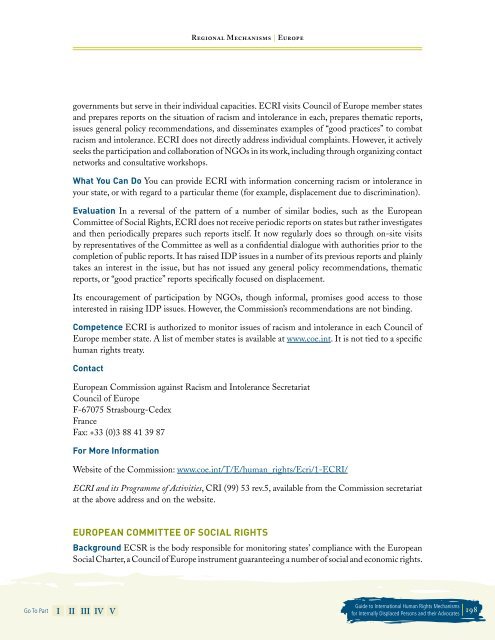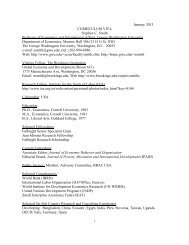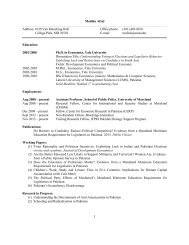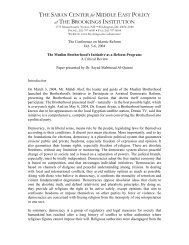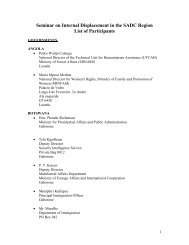Guide to International Human Rights Mechanisms - Brookings
Guide to International Human Rights Mechanisms - Brookings
Guide to International Human Rights Mechanisms - Brookings
You also want an ePaper? Increase the reach of your titles
YUMPU automatically turns print PDFs into web optimized ePapers that Google loves.
Go To Part I II III IV V<br />
governments but serve in their individual capacities. ECRI visits Council of Europe member states<br />
and prepares reports on the situation of racism and in<strong>to</strong>lerance in each, prepares thematic reports,<br />
issues general policy recommendations, and disseminates examples of “good practices” <strong>to</strong> combat<br />
racism and in<strong>to</strong>lerance. ECRI does not directly address individual complaints. However, it actively<br />
seeks the participation and collaboration of NGOs in its work, including through organizing contact<br />
networks and consultative workshops.<br />
What you can Do You can provide ECRI with information concerning racism or in<strong>to</strong>lerance in<br />
your state, or with regard <strong>to</strong> a particular theme (for example, displacement due <strong>to</strong> discrimination).<br />
evaluation In a reversal of the pattern of a number of similar bodies, such as the European<br />
Committee of Social <strong>Rights</strong>, ECRI does not receive periodic reports on states but rather investigates<br />
and then periodically prepares such reports itself. It now regularly does so through on-site visits<br />
by representatives of the Committee as well as a confidential dialogue with authorities prior <strong>to</strong> the<br />
completion of public reports. It has raised IDP issues in a number of its previous reports and plainly<br />
takes an interest in the issue, but has not issued any general policy recommendations, thematic<br />
reports, or “good practice” reports specifically focused on displacement.<br />
Its encouragement of participation by NGOs, though informal, promises good access <strong>to</strong> those<br />
interested in raising IDP issues. However, the Commission’s recommendations are not binding.<br />
competence ECRI is authorized <strong>to</strong> moni<strong>to</strong>r issues of racism and in<strong>to</strong>lerance in each Council of<br />
Europe member state. A list of member states is available at www.coe.int. It is not tied <strong>to</strong> a specific<br />
human rights treaty.<br />
contact<br />
European Commission against Racism and In<strong>to</strong>lerance Secretariat<br />
Council of Europe<br />
F-67075 Strasbourg-Cedex<br />
France<br />
Fax: +33 (0)3 88 41 39 87<br />
for more information<br />
Regional <strong>Mechanisms</strong> | Europe<br />
Website of the Commission: www.coe.int/T/E/human_rights/Ecri/1-ECRI/<br />
ECRI and its Programme of Activities, CRI (99) 53 rev.5, available from the Commission secretariat<br />
at the above address and on the website.<br />
euroPean commiTTee of social righTs<br />
Background ECSR is the body responsible for moni<strong>to</strong>ring states’ compliance with the European<br />
Social Charter, a Council of Europe instrument guaranteeing a number of social and economic rights.<br />
<strong>Guide</strong> <strong>to</strong> <strong>International</strong> <strong>Human</strong> <strong>Rights</strong> <strong>Mechanisms</strong><br />
for Internally Displaced Persons and their Advocates 1 8


